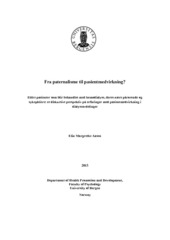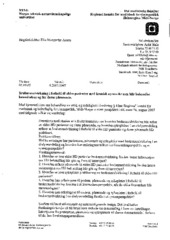| dc.contributor.author | Aasen, Elin Margrethe | |
| dc.date.accessioned | 2013-05-16T12:58:57Z | |
| dc.date.available | 2013-05-16T12:58:57Z | |
| dc.date.issued | 2013-03-06 | eng |
| dc.identifier.isbn | 978-82-308-2227-2 | eng |
| dc.identifier.uri | https://hdl.handle.net/1956/6622 | |
| dc.description.abstract | The rights of patients and their families to participate in treatment and health care are guaranteed by international law and by national law in Norway since 1999. The overall aim of this thesis is to explore and analyze the discursive practices of patient participation in the context of hemodialysis. It is not found previous studies that deal with this topic. Research Questions: 1. How do older patients with chronic renal failure undergoing hemodialysis treatment perceive patient participation? 2. How do family members of older patients with chronic renal failure undergoing hemodialysis treatment perceive patient participation? 3. How do nurses perceive the way in which patients over 75 years undergoing hemodialysis and their next of kin participate in treatment and interact with the clinical team? Method and theory: The studies have an explorative, qualitative and critical approach. Data were derived from transcribed interviews with eleven patients, seven family members and ten nurses. Fairclough’s critical discourses analysis was used to analyze the data, and interpretations were undertaken through Fairclough’s discourse theory, theory about patient participation and ethical theory. Results: From the patients perspective two discursive practices are found: 1) the health-care team`s power and dominance 2) the patients struggling for shared decision- making. From the family members perspective three discursive practices were found: (1) to care and take control, (2) to struggle for involvement, and (3) to be forgotten and powerless. From a nurse's perspective, three discursive practices were found: 1) the nurses' power and control, 2) sharing power with the patient, 3) transferring power to the next of kin. Conclusion: The rights of older patients and their next of kin to participate in hemodialysis treatment seemed not to be well integrated as a social practice in dialysis units. The predominant discourse in the dialysis units in connection to older patients undergoing hemodialysis treatment and their next of kin seemed to have an ideology of paternalism. The paternalistic discourse was dominant both in the patients, the next of kin and the nurses’ stories. The nurses generally used a biomedical explanation and passive patients and the ethical principle of beneficence to justify their actions. However, from both the patients and their next of kin and the nurses there was a discourse of patient participation, a discursive practice with focus on dialogue, shared power and shared decision-making, as can be seen as a hegemonic struggle to establish ideological meaning of patient participation. The patients and their next of kin struggle for participation, some of the nurses express an ideology and a social practice of patient participation. These nurses showed support for engaging in dialogue and shared decision-making and for using ethical narratives as a way of allowing older patients undergoing hemodialysis to participate in their treatment. The nurses justified their actions with relational ethics. The difficult decisions in relation to termination of treatment seemed to involve autonomous decision-making and the ethical principle of autonomy as is transferred to the next of kin. Changing the social practices in dialysis units from a paternalistic ideology to an ideology of patient participation will require an assessment of the context, the dialogue and the process of sharing power and decision making with patients and their family. | en_US |
| dc.description.abstract | Pasientenes og de nære pårørendes rett til medvirkning i behandling og omsorg er nedfelt i internasjonale lover og nasjonale lover siden 1999. Det overordnete målet med denne avhandlingen er å utforske og analysere diskursive praksiser for pasientmedvirkning i en kontekst av hemodialysebehandling. Forskningsspørsmål: 1. Hvordan erfarer eldre pasienter med kronisk nyresvikt som blir behandlet med hemodialyse pasientmedvirkning? 2. Hvordan erfarer nære familiemedlemmer til eldre pasienter med kronisk nyresvikt som blir behandlet med hemodialyse medvirkning? 3. Hvordan erfarer sykepleiere at pasienter over 75 år som blir behandlet med hemodialyse og deres nære pårørende medvirker og samhandler med det kliniske teamet? Metode og teori: Studiene har en kvalitativ, utforskende og kritisk tilnærming. Elleve pasienter, syv pårørende og ti sykepleiere forteller om sine erfaringer med pasientmedvirkning i dialyseavdelingene. Fortellingene blir analysert og fortolket ved hjelp av Faircloughs kritisk diskursanalyse, teori om pasientmedvirkning og etisk teori. Resultater: Fra et pasientperspektiv ble to diskursive praksiser funnet; 1) helsepersonells makt og dominans, og 2) pasientens kamp om medvirkning. Fra et pårørendeperspektiv ble tre diskursive praksiser funnet; 1) å gi omsorg og ha kontroll, 2) å sloss for involvering, og 3) å bli glemt og maktesløs. Fra et sykepleierperspektiv ble tre diskursive praksiser funnet; 1) sykepleiers makt og kontroll, 2) å dele makt med pasienten, og 3) overføre makt til pårørende. Konklusjon: Eldre pasienter og deres pårørendes rett til medvirkning i hemodialysebehandling ser ikke ut til å være godt integrert som en sosial praksis i dialyseavdelingene. Den dominerende diskursen i dialyseavdelingene i forhold til eldre pasienter som blir behandlet med hemodialyse og deres nære pårørende ser ut for å ha en ideologi av paternalisme. Den paternalistiske diskursen dominerte både i pasientenes, nære pårørende og fra sykepleiernes fortellinger. Sykepleierne begrunnet sine handlinger med biomedisinsk forklaringer og passive pasienter og rettferdiggjorde sine handlinger med det etiske prinsippet om velgjørenhet. Men, både fra pasientene og deres nære pårørende og sykepleierne var der en pasientmedvirkningsdiskurs. En diskursiv praksis med fokus på dialog, delt makt og felles beslutninger, som kan sees på som en hegemonisk kamp om å etablere ideologiske meninger av pasientmedvirkning. Pasientene og de nære pårørende kjempet for pasientmedvirkning, noen av sykepleierne uttrykte en ideologi og en sosial praksis av pasientmedvirkning. Disse sykepleierne viste til dialog, felles beslutninger og bruk av etiske fortellinger som en måte å la de eldre hemodialysepasientene ha medvirkning i hemodialysebehandlingen. Sykepleiere rettferdiggjorde sine handlinger ved hjelp av relasjonsetikken. I forhold til de vanskelige avgjørelsene ved avslutning av hemodialyse behandling ser det ut for at beslutningene og det etiske prinsipp om autonomi er blitt overført til de nære pårørende. Å forandre den sosiale praksisen i dialyseavdelingene fra en paternalistisk ideologi til en ideologi om pasientmedvirkning vil kreve en vurdering av konteksten, dialogen og prosessen med å dele makt og beslutninger med pasient og pårørende. | en_US |
| dc.language.iso | nob | eng |
| dc.publisher | The University of Bergen | eng |
| dc.relation.haspart | Paper I: Aasen E.M., Kvangarsnes M., & Heggen K. (2012) Perceptions of patient participation amongst elderly patients with end stage renal disease in a dialyse unit. Scandinavian Journal of Caring Sciences. 26 (1), 61 – 69. Full text not available in BORA due to publisher restrictions. The published version is available at: <a href="http://dx.doi.org/10.1111/j.1471-6712.2011.00904.x" target="blank">http://dx.doi.org/10.1111/j.1471-6712.2011.00904.x</a> | eng |
| dc.relation.haspart | Paper II: Aasen E.M., Kvangarsnes M. Wold B., & Heggen K (2012) The next of kin of older people undergoing haemodialysis: a discursive perspective on perceptions of participation. Journal of Advanced Nursing. Aug; 68(8):1716-25. Full text not available in BORA due to publisher restrictions. The published version is available at: <a href="http://dx.doi.org/10.1111/j.1365-2648.2011.05854.x" target="blank">http://dx.doi.org/10.1111/j.1365-2648.2011.05854.x</a> | eng |
| dc.relation.haspart | Paper III: Aasen E.M., Kvangarsnes M., & Heggen K. (2012) Nurses` perceptions of patient participation in hemodialysis. Nursing Ethics. May; 19(3):419-30. Full text not available in BORA due to publisher restrictions. The published version is available at: <a href="http://dx.doi.org/10.1177/0969733011429015" target="blank">http://dx.doi.org/10.1177/0969733011429015 </a> | eng |
| dc.title | Fra paternalisme til pasientmedvirkning? Eldre pasienter som blir behandlet med hemodialyse, deres nære pårørende og sykepleiere: et diskursivt perspektiv på erfaringer med pasientmedvirkning i dialyseavdelinger | eng |
| dc.type | Doctoral thesis | |
| dc.rights.holder | Copyright the author. All rights reserved | |

